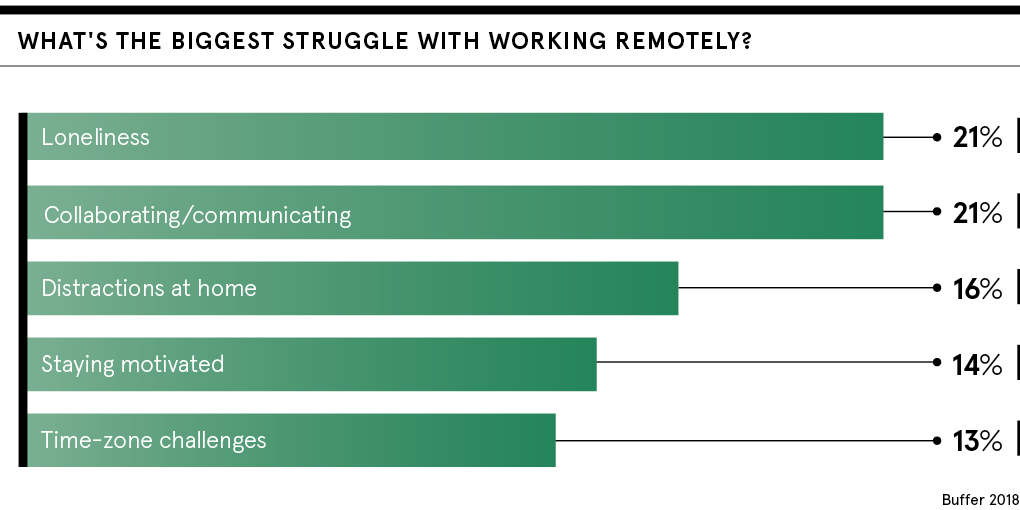When I first went freelance, I was determined to go it alone. In the beginning, this was empowering; I set my own hours, worked only with clients I wanted to and generally had more professional satisfaction than I had in office jobs. The very sharp double-edged sword of working for yourself, however, is dealing with something else that comes with working on your own: loneliness.
I notice that I’ll start to feel miserable if I’ve been working from home for a while
The self-employed sector now accounts for nearly 15 per cent of the UK’s workforce. As this group continues to grow at an increasing pace – the number of self-employed workers over the age of 65 has nearly tripled since the recession – the unique set of challenges independent workers face need to be addressed, starting with freelancer isolation.
How co-working spaces can combat loneliness
I’m not alone in feeling alone as a self-employed worker; a 2018 survey by Epson found that nearly half (48 per cent) found it lonely. So I spoke to other self-employed workers and industry experts to find out how freelancers can solve loneliness and isolation.
“Freelancing is a liberating and flexible way to work, but it’s not without its challenges,” says Chloé Jepps, deputy head of research at the Association of Independent Professionals and the Self-Employed (IPSE).
According to Ms Jepps, co-working spaces can be a solution for freelancers who want to recapture the support and camaraderie of an office environment.
“Co-working spaces are also a great opportunity for the fruitful collaborations that fuel the dynamism and creativity of the flexible economy,” she says.
Caroline McShane, independent social media consultant and member of Growth Hub in Cirencester, says: “We all support each other by acting as sounding boards or offering advice when asked. I would go as far as to say there are more experts here than in any other office or business I have worked in or for. I guess you could say we all work alone together.”
The impact of freelancer isolation on mental health
Finding a way to combat loneliness is more than a productivity issue, it’s also a pressing mental health concern. Matthew Knight, independent strategist who works on freelancer mental health campaigns, says: “While those who switch to a freelance life generally report they are happier, it’s the unique set of challenges a freelancer faces that put independent workers more at risk of dropping into poor mental health.”
Mr Knight says that there are many small things which freelancers can do that will not only help combat loneliness, but also keep their mental health in shape. These include joining a community, but also maintaining a schedule that works for the individual, looking after physical health and talking to clients about the stresses of freelancing.
“From reducing your payment terms or just letting you work from their space, there are plenty of things which those we work with can do to support us,” he says.

Virtual spaces helping freelancers feel connected
Many sole traders and individual freelancers, however, don’t find co-working spaces work for them. In fact, according to research from IPSE, 76 per cent of freelancers have never used a co-working space. The association believes this is an issue for government to address.
“There are still nowhere near enough places for co-working and government must work to open more up,” says IPSE’s Ms Jepps. “The government should extend rate relief to co-working spaces and publicise unused buildings where co-working spaces could be created.”
Many freelancers instead gravitate towards virtual spaces to interact with one another. Mr Knight started a Slack group called Leapers to “support anyone who wants to work differently”. Members of the community celebrate each other’s wins, and offer help and advice to one another.
I moderate a Facebook group for UK-based freelance journalists, which acts as a peer-to-peer support group. It was through that group that freelance journalist Abby Young-Powell started holding regular meet-ups for London-based freelancers to work together two days a week.
“What I miss most about being in an office is being sociable,” says Ms Young-Powell. “Going for afterwork drinks and having someone to bounce ideas around with. I notice that I’ll start to feel miserable if I’ve been working from home for a while.”
The benefits of creating a freelance community
After posting on the Facebook group asking if anyone wanted to meet, she found a group of freelancers who were keen to work together in venues such as the British Library and Barbican that allow free use of their space where individuals can work.
Members of the community, which now also has a WhatsApp group of 27 participants, continues to meet twice a week to work and socialise. “It’s inspiring to have a core group of people who are all doing interesting work, but also going through the same struggles,” she says.
Ms Young-Powell’s tight-knit professional community speaks to my own personal favourite aspect of being self-employed: picking your own colleagues. I have a couple of “work wives”, close friends whom I turn to for professional advice. They are all female friends who are in the same industry as me; we celebrate each other’s successes together and counsel one another on any tricky situations.
Whether it’s through on or offline communities, developing professional relationships with people you’ve chosen to work alongside can make the isolating business of working for yourself feel less lonely.
How co-working spaces can combat loneliness
The impact of freelancer isolation on mental health

